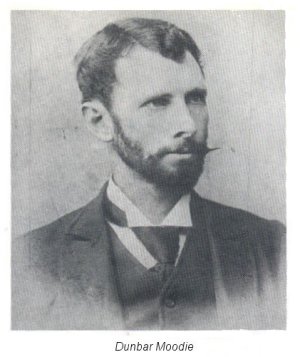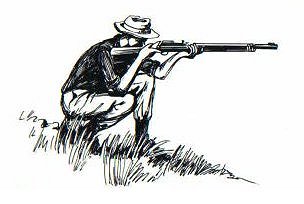
About September 1895 Dr. Jameson telegraphed to Longden, then
Magistrate at Tuli, that certain friction at Melsetter rendered it inadvisable
for Heugh to return and that someone reliable had to be sent there immediately
to settle matters and report. Longden had been specially selected for the
mission, and it was important that he should take charge there as soon as
possible.
Longden interviewed Jameson in Salisbury and commandeered a
four-wheeled Government wagonette to transport himself and his kit to Melsetter.
He also bought a horse, but it died on the way.
As he approached Melsetter he thought that of all Southern Africa this
was one of the most beautiful parts: the great Chimanimani Mountains with
springs sparkling and dancing, the cool and crisp nights, the champagne-like
air, the parkland, the dense jungle and the birds all combined to affect deeply
the man who had been a wanderer for so many years.
On 16th November 1895 the farmers wrote again from Rocklands, this time
to welcome Longden, sincerely hoping that his experience and the different
appointments he had held would enable him to judge what was required to promote
the interests of the B.S.A. Company and the public at large. It was signed by
many residents, headed by M. J. Martin, J. Henry and G. B. D. Moodie, but the
tone of the letter is distinctly less effusive than that of the one addressed to
Heugh six months earlier.
Longden
installed himself at Kenilworth and was immediately involved in
the tangled problem of the transfer of the township. He investigated the
minority opposition to the choice of Dunbarton, wishing to be guided by local
feeling. He felt it was important that the whole community should be agreed, and
gathered that the unanimity of feeling had been greatly brought about by
Strasheim�s tact. Martin had earlier said that, if the proposals for
establishing the town on Dunbarton fell through, he would be prepared to grant a
portion of Rocklands to the D.R. Church for erecting a church and school, but it
was not necessary to take up this offer.

Dunbar�s claim to Fairfield was a problem, but by the end of November
Longden had persuaded him to relinquish any claim which he might have had to the
ground in dispute. Heyns suffered some inconvenience at the unnecessary delay
but when the matter was settled he was also granted two stands in the township
at the value of �25 each, which were liable for survey expenses, stamps and
quitrent.
Longden visited Dunbarton, and described the site as high,
well-drained, central, beautifully situated and perhaps the most healthy spot
that could have been selected. The only fear he had in regard to its
recommendation was that the area available for the town appeared rather small,
but Orpen, on roughly measuring the ground, assured him that there was room on
specially suitable ground for at least 200 stands and streets, and open ground
around for plenty more.
In December Longden said that having the Company�s offices on Dunbar�s
private farm was not satisfactory, and that, as considerable expense had been
incurred in building huts on Dunbarton, he proposed to move there at once, but
he then decided to wait for Llewellyn Cambria Meredith, who was due to take over
from T. B. Hulley as Native Commissioner.

About the 1st January 1896 Meredith reached Dunbarton after taking
twelve days from Umtali. The journey was rough as it was raining, he had
insufficient oxen, and had to drive and do all the work himself. As the
Magistrate was expected at Dunbarton in three days� time Meredith decided to
wait, and sent a message to Longden to report his arrival. Longden replied on
6th January, saying that Meredith should carry on to Kenilworth as no
preparations had been made at the new township for the accommodation of the
Native Department and the huts built for the Magistrate and the Police were
barely adequate, and that Meredith would be more comfortable at Kenilworth and
better placed for carrying on his work.
Meredith carried on to Kenilworth by wagon and met Longden. Hulley had
left a few days before on horseback by footpath, so Meredith did not meet him,
and had no horse for his own use.
Before leaving Kenilworth Longden asked Umtali Postmaster for an
assortment of postal stamps, and said that if they did not arrive soon all
letters would be sent in unstamped as stocks had run out. As the public offices
had been moved to the new township, he recommended that a branch post office
should be opened at Kenilworth for the convenience of residents in
the southern part of the district.
A few days later he reported from Dunbarton that things were progressing
slowly but satisfactorily, and that he had been able to reconcile the
conflicting interests and had managed the move without any opposition. He found
the office accommodation ridiculously inadequate, no hut for the Magistrate�s
clerk, no gaol accommodation, and no provision for feeding prisoners, and said
that if they had white prisoners at any time he would be at a loss to know what
to do with them.
Everyone settled down to daily tasks, and Melsetter township, a tiny
cluster of poleand-dagga huts, 5000� above sea level, in a beautiful, remote and
not easily accessible corner of Rhodesia, was established.
Melsetter�s guide and mentor for many years was Will Longden. Soon
after moving to the new site he wrote that he was charmed with the appearance
and farming prospects, and would be prepared and would like to be permanently
stationed here. His desire was fulfilled, and he took a keen personal interest
in everything: he wrote voluminously on every aspect of life, he teased the
Government for better facilities, and he was indefatigable in working for the
place and people he loved.
It took some time for him to be accepted by the Melsetter residents who
were very wary of Government officials after their previous experiences, but
luckily Longden was an excellent shot, which appealed to them, and he could talk
Afrikaans and read and write High Dutch, which was a great help in getting on
with them. He had ample opportunity in the first year of proving his worth, and
gradually the community�s reserve melted. He is remembered as having had some
faults but having been honest, absolutely fair and very strict: if even only a
sixpence were involved the debt had to be settled.
The Portuguese had made several moves to try to stop the Gazaland
occupation, claiming that the territory was theirs, and one of Longden�s first
tasks was to try to get the matter settled. He met Lieutenant Serego on the
Border during January 1896 to discuss the problem and some of the tension was
relieved, but he found the local feeling very bitter and saw no chance of a
lessening of disputes as long as the boundary was undefined. Many landowners
were uneasy as it seemed likely that parts at least of some occupied farms would
fall within Portuguese territory, and the tribesmen were unsettled at having to
pay hut tax to the B.S.A. Co. and also being badgered for taxes by the
Portuguese.
An Anglo-Portuguese Convention was drawn up, but until the survey was
completed there was uncertainty regarding the exact position of the border line.
Orpen fixed points with a view to facilitating future survey operations and
became acquainted with the intolerable state of affairs regarding the
molestation of natives by the Portuguese and the preposterous claims made by
them, and his large experience in land-surveying and the advantage of personal
inspection of the country enabled him to form an accurate interpretation of the
terms of the Convention. During 1896 an Italian arbitrator, who had never seen
the country he was dividing up, was appointed to define the boundary.

In the township the administrative offices were functioning
satisfactorily, with Twentyman as C.C.�s clerk and Edgar Hoal clerk to the
Magistrate at a salary of �20 a month and rations. Longden�s duties apparently
included those of storekeeper, as Markham wrote from Westward Ho! asking for
paraffin to be sent and the cost to be deducted from pay due to him.
It is interesting to note how payment was made. Longden found that, on
account of the scarcity of silver in the cash sent to him, he had the greatest
difficulty in paying officials. Silver was exceptionally scarce, hut tax was
almost exclusively collected in gold and could not be regularly depended on, and
he asked for a large proportion of silver to be sent in future.
Predikant le Roux, in addition to his pastoral duties in his far-flung
parish, started a school in thatched huts.
Some farmers owned horses, but
most were dependent on walking or on the slow plodding oxwagon for all
transport, and the quarterly Nachtmaal (Communion) services held by le Roux were
very big occasions for all the scattered families. Wagons from all over the
three districts converged on the township, most taking many days to reach their
destination, and all spending a long weekend in Melsetter.
The Church services were attended by all, and the opportunity was taken for
baptisms and marriages � which were also solemnised by M. I. Martin in his
capacity of Marriage Officer for the D.R.C. in Gazaland. Melsetter Farmers�
Association (F.A.), founded on 27th August 1895, met regularly at this quarterly
interval, dances were held, schooling problems were discussed, and all matters
talked over during the few days they were all together.
Government officials were very dependent on horses, and Longden found
that he was considerably handicapped through having an old, stiff-jointed,
knocked-up horse as his only mount when he arrived. He had difficulty in
arranging for his clerks to get to Melsetter and he put in an urgent plea for
his Department to be supplied with mounts. He wanted to get round the district
while his clerks did the office work, and needed at least two good horses, one
as a pack animal: as the rainy season had set in he could not attempt the trip
without full equipment. Presumably horses were sent, and by the end of 1897 it
was possible to buy some locally and he was then personally offered the choice
of a mare or a horse for �100 with a six months� guarantee.
Mails came very erratically. To Umtali they came by road coach from
Salisbury and from Chimoio, and were sent on to Melsetter by runner or
occasionally with official visitors. The Umtali Postmaster kept Longden informed
with each batch when the next could be expected, and engaged special runners
when there was important news to get through but pointed out, when Melsetter
complained of not receiving any mail, that there was no point in sending runners
when there was no mail or news of any kind.